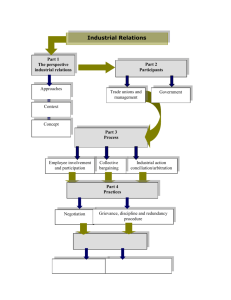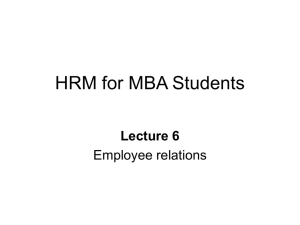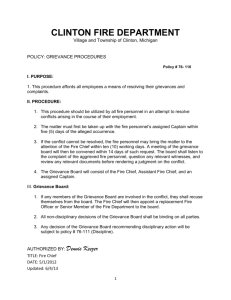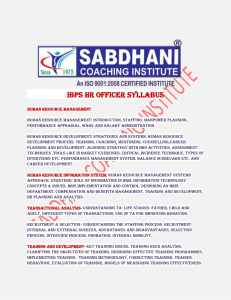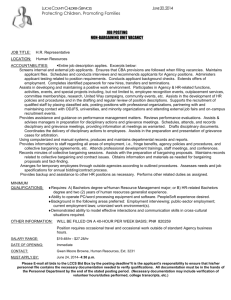Principles of Discipline - Department of Management Services
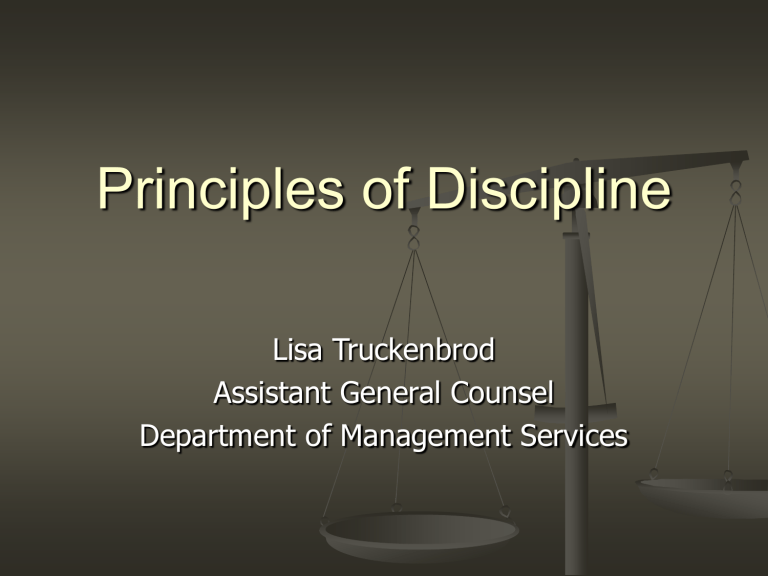
Principles of Discipline
Lisa Truckenbrod
Assistant General Counsel
Department of Management Services
What is Discipline?
Definition
“Correction, chastisement, punishment, penalty.
To bring order upon or bring under control.”
- Black’s Law Dictionary
“Punishment; instruction; a control gained by enforcing obedience or order; to train or develop by instruction and exercise”
Webster’s Ninth New Collegiate Dictionary
What is Discipline?
Purpose
To train and instruct the employee to function appropriately in his position.
Function
The means by which we give formal notice to an employee of 1) what the employee did wrong;
2) the rule or standard violated; and 3) what action is being taken against the employee
Authority for Discipline
Chapter 110, Florida Statutes
Chapter 60L-36.005, Florida Administrative
Code
Collective Bargaining Agreements
Career Service System
“Any employee who satisfactorily completed at least a 1 year probationary period in his or her current position may be suspended or dismissed only for cause
. . .”. Ch. 110.227(1), Florida Statutes
.
Selected Exempt Service
“Employees in the Selected Exempt
Service shall serve at the pleasure of the agency head and shall be subject to suspension, dismissal, reduction in pay, demotion, transfer or other personnel action at the discretion of the agency head . . . .” 110.604, Florida Statutes.
Senior Management Service
System
No statutory provision relating to discipline
No cause required based on Rule 60L-
36.005(3), F.A.C.
Rule 60L-36.005
Disciplinary Standards
Identifies minimal conduct standards that apply to all employees in the State
Personnel System
Permanent career service employees may be suspended or dismissed only for cause
Employees outside of the permanent career service may be dismissed at will
Cause Required for Discipline?
Cause Required Cause Not Required
Permanent, Career
Service Employees
SES Employees
SMS Employees
Probationary
Employees
Collective Bargaining Agreements
Each collective bargaining agreement includes a discipline article which reflects the principles established by Chapter 110,
Florida Statutes and Rule 60L-36.005,
F.A.C.
Some agreements cover Career Service
Employees and others cover SES
Employees
Collective Bargaining Agreements
Career Service Selected Exempt Service
AFSCME
IUPA
PBA SSU
PBS SAU
FSFSA
FNA
FPD Physicians Unit
FPD Supervisory Non-
Professional Unit
FPD State Employees
Attorneys Guild
(SEAG)
Role of the Supervisor
Establish work environment where employees feel they are treated fairly and can communicate openly with supervisor
Communicate performance expectations to employees
Communicate standards of conduct to employees
Counsel employees when necessary
Take disciplinary action when necessary; A good supervisor understand the proper use of discipline, and is prepared to take action that is fair, justified and necessary
Communicate Performance
Expectations to Employees
Review performance standards with employees regularly
Emphasize success based on performance
Communicate Standards of
Conduct to Employees
Provide employees access to Chapter 110,
Florida Statutes, Rule 60L-36.005, F.A.C.
Provide employees with a copy of agency specific policies and procedures that govern employees conduct and performance
Ensure that employees understand policies, procedures and standards of conduct, as well as the consequences of failing to comply with them
Counseling
Used to help employee recognize a deficiency, accept the standard that is required, and understand the consequences of failing to meet the standard
Goal: Help the employee correct the problem or behavior
Counseling is not considered discipline
Typically used when behavior is not egregious but has potential for continuing or worsening over time, i.e. tardiness, absenteeism
Not necessarily appropriate in egregious situations such as fighting, theft, insubordination
Counseling Tips
Be a good listener
Be specific regarding expectations and consequences of failing to meet expectations
Maintain privacy
Maintain objectivity
Avoid hostility & defensiveness
Never make excuses for enforcing the rules
Administering Discipline
Career Service System Employees
Agency policies and procedures and employee performance expectations must be explained and clearly defined
Disciplinary standards must be explained and made available to all employees with written documentation of receipt
Discipline should be administered fairly, promptly and in an expeditious manner
Delay raises question of whether discipline is necessary
Administering Discipline
Career Service System Employees
Establish Cause
Determine level of discipline to be administered
Provide employee with Notice of intent and opportunity to appear before the agency
Take Disciplinary Action
Establishing Cause
What is Cause?
Cause is identified in Ch. 110.227(1), Florida Statutes and in Rule 60L-36.005, F.A.C. to include, but not be limited to:
Poor Performance
Negligence
Inefficiency or inability to perform assigned duties
Violation of law or agency rules
Conduct unbecoming a public employee
Misconduct
Habitual drug use
Conviction of any crime, including a plea of nolo contendere and a plea of guilty with adjudication withheld
Establishing Cause
Agency bears the burden of proof:
“Before taking corrective action, an agency shall have evidence that an employee failed to comply with a standard or expectation.” Rule 60L-36.005(4), F.A.C.
Ensures that supervisors and managers do not take arbitrary or capricious action against a Career Service employee
Considerations when Establishing
Cause
Notice
Alleged violation reasonably related to employee’s job
Proof of Misconduct
•
Documentation
•
Investigatory Interviews
Appropriateness of Discipline
Proof of Misconduct
Disciplinary Investigation Interview – meeting in which employee is being question relative to alleged misconduct
Employee entitled to representation, i.e.
Union or attorney
Management must advise employee in advance as to nature of meeting
Appropriateness and Level of
Discipline
Oral Reprimand
Written Reprimand
Suspension
Dismissal
Reduction in pay
Demotion
Notice of Intent
Ch. 110.227(5)(a), Florida Statutes
Written notice of proposed action at least
10 days prior to date of action
Notice delivered personally or by certified mail
Must give employee opportunity to appear before the official taking the action to respond to charges
Notice of Intent
Ch. 110.227(5)(b), Florida Statutes
Employee may be disciplined without 10 days prior written notice in extraordinary circumstances, i.e. when retention of employee would result in:
1. Damage to state property; or
2. Detriment to best interest of the state; or
3. Injury to employee, fellow employee, or others
Notice of Discipline
Written notice of final action taken
Must include notice of employee’s right to appeal the disciplinary action:
To the Public Employees Relation Commission (PERC)
Under any applicable collective bargaining agreements
Pursuant to other applicable statutory provisions, i.e. Parts
VI or VIII of Chapter 112, Florida Statutes.
Public Employee Relations
Commission (PERC)
Notice of appeal must be filed with PERC within 14 days after the date on which the disciplinary action is received by the employee.
PERC hearing held within 30 calendar days following the filing of a notice of appeal
PERC determines whether or not cause existed for the agency action.
If no cause, employee may be reinstated with or without back pay.
PERC may not reduce the penalty imposed by the agency unless law enforcement, correctional officers, firefighters, professional health care providers
Collective Bargaining
Grievance Procedure
Ch. 447.401, Florida Statutes provides that the State and the Union shall negotiate a grievance procedure which shall have an arbitration hearing as its final step
Each CB agreement that covers career service employees contains a discipline article which prohibits discipline without cause.
An employee covered by a collective bargaining agreement (even if not a member of the union) may file a grievance pursuant to Grievance Procedure set forth in the agreement, alleging a violation of the agreement’s discipline article, i.e. that the employer did not have just cause to discipline the employee.
Collective Bargaining
Grievance Procedure
Oral Step
Step 1
Step 2 – agency head or designee
Step 3 (AFSCME, FNA, PBA SSU, PBA SAU only) - DMS
Arbitration – neutral arbitrator
Collective Bargaining
Grievance Procedure
Grievances are to be filed at the at the lowest level of management having authority to adjust the grievance.
Disciplinary grievances – file at Step 2
Grievance must include:
facts on which the grievance is based specific provisions of the CB agreement allegedly violated
issues support alleged violation relief requested
Collective Bargaining
Grievance Meeting
Purpose
Review all relevant facts
Identify facts that are in dispute
Attempt to resolve disputed facts
Address each argument raised in defense of the employee
Weigh the likelihood of success of failure at a higher level hearing.
Collective Bargaining
Grievance Meeting
Listen to Employee’s side of the story
Remain objective; avoid allowing personality conflicts to interfere with judgment
Provide grievant with all necessary information
Collective Bargaining
Disciplinary Grievance Response
Grievance Review Procedures
Review the specific disciplinary standard the employee was alleged to have violated
Review the evidence. Look for inconsistencies or conflicting statements. Identify relevant documents to support the disciplinary action
Consider the availability of witness should the case go to an evidentiary hearing
Review the justification and severity of discipline.
Consider how an impartial reviewing party would evaluate the evidence and resulting discipline.
Collective Bargaining
Grievance Response
Grievance responses should include the following:
A brief statement of the relevant facts
Identify the standards of conduct that were violated by the employee and that lead to the disciplinary action taken
Identify the contract article in the CB agreement alleged by the grievant to have been violated
Identify each issue raised by the grievant and respond to each issue
Include a statement of conclusions
Include a decision as to whether to sustain or deny the grievance base on the conclusions reached
Collective Bargaining
Grievance Arbitration
If the grievant is not satisfied with the responses s/he has received at the various steps of the grievance procedure, s/he may file a request for arbitration.
DMS schedules arbitration
Arbitrator chosen in rotation from agreed upon panel
Arbitrator’s decision is final and binding – no appeal.
Grievance Resolution or Settlement
Parties can agree at any time prior to issuance of arbitrator’s award to settle a grievance.
Typically, the settlement of a disciplinary grievance includes a statement that the employee “resigns in lieu of termination”.
Settlement agreements may also address issues of back pay, references, eligibility for rehire.
Collective Bargaining
Grievance Representatives
Employee is entitled to Union representation in the Grievance meeting(s)
Collective bargaining agreement governs the rights and duties of grievance representatives
Administering Discipline
“At Will”
SES Employees
SMS Employees
Probationary Employees
![Labor Management Relations [Opens in New Window]](http://s3.studylib.net/store/data/006750373_1-d299a6861c58d67d0e98709a44e4f857-300x300.png)


